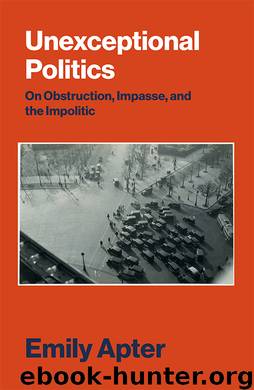Unexceptional Politics: On Obstruction, Impasse, and the Impolitic by Emily Apter

Author:Emily Apter [Apter, Emily]
Language: eng
Format: epub
Tags: Anthropology, Cultural & Social, History & Theory, Literary Criticism, Philosophy, Political Science, Social Science, Subjects & Themes
ISBN: 9781784780852
Google: vn3cDQAAQBAJ
Amazon: B01N0YRRKK
Publisher: Verso
Published: 2018-02-06T03:00:00+00:00
Sleaze, fear, and criminality come together as the elements that will forge Rougon’s aggrandized power. As he breathes in the fatal atmosphere he gathers resolve for a more ruthless mode of governance. “Jules, give me a synonym for authority,” Rougon says to his secretary, as he prepares a series of repressive decrees. “‘Well, there’s power, government, empire,’ the young man answer[s] with a smile.”14
Walter Benjamin’s gnomic assertion, in Paris, Capital of the Nineteenth Century, that “Empire is the style of revolutionary terrorism, for which the state is an end in itself” refers to the empire of Napoleon I, but finds equal exemplification in the Second Empire of Napoloeon III.15 For, as Benjamin implies, Napoleon III’s success lay precisely in crafting a Second Empire style—repressive governance infused into the materials of technological, aesthetic modernity—that sublated revolution and subsumed bourgeois domination and state functionalism. In Son Excellence, one could say, the “Empire Style” is immanent not only in the pompier décor of the Assembly, the salon, and the public square, festooned with pompous emblems of state power (let us recall the ridiculous statue that Napoleon III commissioned of himself in the likeness of Vercingétorix, which graces the excavation site at Alésia), but also in authoritarian weather; a stultifying atmosphere of corrupted democracy, approximating what Gilles Châtelet dubbed “thermocracy,” a term applying broadly to “hydraulic despotisms” and to “social chemistry that operates internally, through dissolutions, catalyses and fermentations that implcably inundate the bulkheads that supposedly divided oft the spheres of politics, economics, and the social.”16
Second Empire politics is an abiding subject of the entire Rougon-Macquart series, most notably of La curée (The Quarry), where government collusion in schemes for kickbacks from windfall profits in the area of real estate speculation are lifted from the playbook of Baron Haussmann’s memoirs. But there is no novel in Zola’s corpus, nor for that matter, any literary work of, or about, the Second Empire, in which politics is so exclusively the focus. What comes into view—and reinforces the thermocratic or environmental structure of the political novel—is the narrative armature of countless subplots, built up from backstories that involve illicit or illegal transactions: patronage, nepotism, scandal-mongering, earmarking, sexual affairs. Sorting through these episodes one cannot but be struck by historical parallels with events that occurred during the administration of George W. Bush.
Most notable is an episode involving earmarking that resembles the “Bridge to Nowhere” scam spearheaded in 2005 by Alaska Senator Ted Stevens (he proposed financing the Gravina Island Bridge, which would be longer than the Golden Gate and would serve only a small airport and fifty residents). In this case, Kahn, a Jewish deputy, joins forces with du Poizat, a sub-prefect who represents Bressuire, to divert a new rail line projected to run from Niort to Angers. Bressuire happens to be the town where Kahn owns a blast furnace operation that will fail to prosper without a transportation link. Kahn had been close to sealing the deal, but he was suddenly blocked by Rougon’s rival, de Marsy, who was furious at being excluded from the deal.
Download
This site does not store any files on its server. We only index and link to content provided by other sites. Please contact the content providers to delete copyright contents if any and email us, we'll remove relevant links or contents immediately.
4 3 2 1: A Novel by Paul Auster(12364)
The handmaid's tale by Margaret Atwood(7750)
Giovanni's Room by James Baldwin(7317)
Asking the Right Questions: A Guide to Critical Thinking by M. Neil Browne & Stuart M. Keeley(5752)
Big Magic: Creative Living Beyond Fear by Elizabeth Gilbert(5749)
Ego Is the Enemy by Ryan Holiday(5412)
The Body: A Guide for Occupants by Bill Bryson(5075)
On Writing A Memoir of the Craft by Stephen King(4925)
Ken Follett - World without end by Ken Follett(4719)
Adulting by Kelly Williams Brown(4564)
Bluets by Maggie Nelson(4542)
Eat That Frog! by Brian Tracy(4518)
Guilty Pleasures by Laurell K Hamilton(4437)
The Poetry of Pablo Neruda by Pablo Neruda(4090)
Alive: The Story of the Andes Survivors by Piers Paul Read(4017)
White Noise - A Novel by Don DeLillo(4000)
Fingerprints of the Gods by Graham Hancock(3985)
The Book of Joy by Dalai Lama(3970)
The Bookshop by Penelope Fitzgerald(3843)
